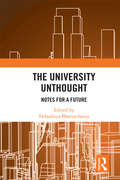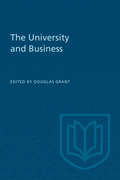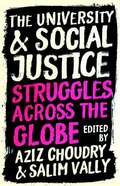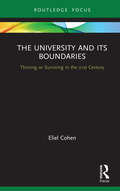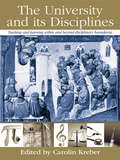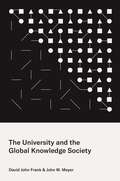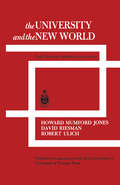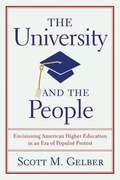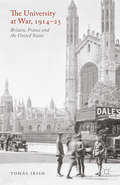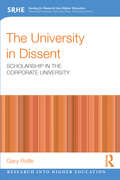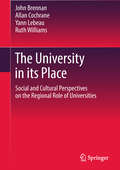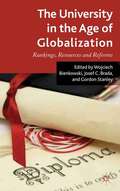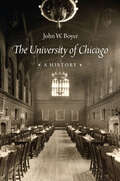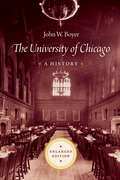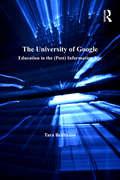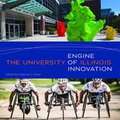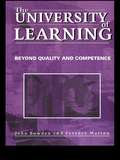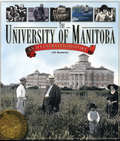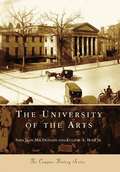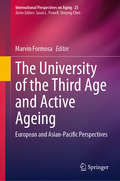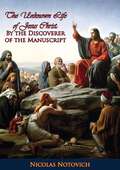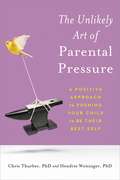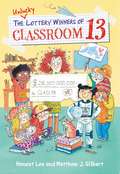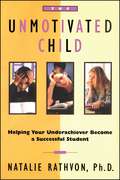- Table View
- List View
The University Unthought: Notes for a Future
by Debaditya BhattacharyaWhy is it important to have a revolutionary critical pedagogy? What are the new inter/disciplinary engagements possible within the university? What will it be like to live and learn in this university of the future? Drawing on these essential questions, this volume explores the political future(s) of the university. It does not take a simplistic recourse to the tenets of liberal democracy but seeks a more engaged positioning of the university space within everyday practices of the social. It cross-examines the history of this ‘ideal’ university’s relationship with the banal everyday, the ‘apolitical’ outside and what exceeds intellectual reason, to finally question if such historicizing of the university is necessary at all. Along with its companion The Idea of the University: Histories and Contexts, this brave new intervention makes a compelling foray into the political future(s) of the university. It will be of interest to academics, educators and students of the social sciences and humanities, especially education. It will also be of use to policy-makers and education analysts, and be central to the concerns of any citizen.
The University and Business
by Douglas GrantThe university today has to accept the responsibility of seeing that those entering business receive the training most advantageous not only to their careers but also to society itself, in which the businessman to-day plays such a significant part. But business in its turn must shoulder a greater share of the responsibility for supporting the university. The essays in this volume help to explore the relations and the mutual responsibilities of the university and business. Professor V. Bladen, Colonel W.E. Phillips, and Dean M. St.A. Woodside of the University of Toronto discuss the problem as Canadians see it; Sir Arnold Plant of London and Dean Stanley F. Teele of Harvard show the English and American attitudes. These essays were first published as a supplement to the University of Toronto Quarterly, but it was felt that as they made such a notable contribution to a problem which is bound to be debated with increasing interest for several years, they should be issued in a separate volume.
The University and Social Justice: Struggles across the Globe
by Aziz Choudry and Salim VallyHigher education has long been contested terrain. From student movements to staff unions, the fight for accessible, critical, and quality public education has turned university campuses globally into sites of struggle. Whether calling for the decommodification or the decolonization of education, many of these struggles have attempted to draw on (and, in turn, resonate with) longer histories of popular resistance, broader social movements, and radical visions of a fairer world. In this critical collection, Aziz Choudry, Salim Vally, and a host of international contributors bring grounded, analytical accounts of diverse struggles relating to higher education into conversation with each other. Featuring contributions written by students and staff members on the frontline of struggles from 12 different countries, including Canada, Chile, France, India, Mexico, Nigeria, Occupied Palestine, the Philippines, South Africa, Turkey, the UK, and the US, the book asks what can be learned from these movements’ strategies, demands, and visions.
The University and its Boundaries: Thriving or Surviving in the 21st Century
by Eliel CohenGrounded in key sociological theory on the concepts of boundaries, power and control, this text addresses the question of whether the university is thriving or merely surviving. Using a sociological lens to consider how institutions must engage in boundary transactions in order to maintain their unique position and identity, this book explores how these transactions also have the potential to undermine academic boundaries. Including a detailed analysis of the activities, organisation and outputs of academic research in the context of science, technology, engineering, mathematics and medicine (STEMM) departments of UK universities, the arguments presented have implications for universities and their stakeholders not only in the UK, but wherever universities face challenges of purpose and identity, particularly where these are shaped by neoliberal modes of governance and management. Insights into how universities must balance the ideas of itself as a teaching institution, a research institution and its broader societal importance and impact make this important reading for higher education scholars and postgraduate students, sociological theorists, and all those interested in the future of the university.
The University and its Disciplines: Teaching and Learning within and beyond disciplinary boundaries
by Carolin KreberUniversity teaching and learning take place within ever more specialized disciplinary settings, each characterized by its unique traditions, concepts, practices and procedures. It is now widely recognized that support for teaching and learning needs to take this discipline-specificity into account. However, in a world characterized by rapid change, complexity and uncertainty, problems do not present themselves as distinct subjects but increasingly within trans-disciplinary contexts calling for graduate outcomes that go beyond specialized knowledge and skills. This ground-breaking book highlights the important interplay between context-specific and context-transcendent aspects of teaching, learning and assessment. It explores critical questions, such as: What are the ‘ways of thinking and practicing’ characteristic of particular disciplines? How can students be supported in becoming participants of particular disciplinary discourse communities? Can the diversity in teaching, learning and assessment practices that we observe across departments be attributed exclusively to disciplinary structure? To what extent do the disciplines prepare students for the complexities and uncertainties that characterize their later professional, civic and personal lives?Written for university teachers, educational developers as well as new and experienced researchers of Higher Education, this highly-anticipated first edition offers innovative perspectives from leading Canadian, US and UK scholars on how academic learning within particular disciplines can help students acquire the skills, abilities and dispositions they need to succeed academically and also post graduation. Carolin Kreber is Professor of Teaching and Learning in Higher Education and the Director of the Centre for Teaching, Learning and Assessment at the University of Edinburgh
The University and the Global Knowledge Society (Princeton Studies In Cultural Sociology Ser.)
by David John Frank John W. MeyerHow the university went global and became the heart of the information ageThe university is experiencing an unprecedented level of success today, as more universities in more countries educate more students in more fields. At the same time, the university has become central to a knowledge society based on the belief that everyone can, through higher education, access universal truths and apply them in the name of progress. This book traces the university's rise over the past hundred years to become the cultural linchpin of contemporary society, revealing how the so-called ivory tower has become profoundly interlinked with almost every area of human endeavor.David John Frank and John Meyer describe how, as the university expanded, student and faculty bodies became larger, more diverse, and more empowered to turn knowledge into action. Their contributions to society underscored the public importance of scholarship, and as the cultural authority of universities grew they increased the scope of their research and teaching interests. As a result, the university has become the bedrock of today's information-based society, an institution that is now implicated in the solution to every conceivable problem.But, as Frank and Meyer also show, the conditions that helped spur the university's recent ascendance are not immutable: eruptions of nationalism, authoritarianism, and illiberalism undercut the university's universalistic and rationalistic premises, and may threaten the centrality of the university itself.
The University and the New World: York University Invitation Lecture Series
by Howard Jones David Riesman Robert UlichThis is the first volume in the Invitation Lecture Series of York University and it is an auspicious beginning. Three leaders in higher education in the United States here present their thoughts on challenging questions of enrolment, curriculum, and standards which today confront the ever expanding universities of North America. Professor Jones describes "The Idea of a University Once More"; Professor Riesman outlines and comments on some significant recent "Experiments in Higher Education"; Professor Ulich discusses a theme which is vitally important for the effect of university education, "Creativity."
The University and the People
by Scott M. GelberThe University and the Peoplechronicles the influence of Populism—a powerful agrarian movement—on public higher education in the late nineteenth century. Revisiting this pivotal era in the history of the American state university, Scott Gelber demonstrates that Populists expressed a surprising degree of enthusiasm for institutions of higher learning. More fundamentally, he argues that the mission of the state university, as we understand it today, evolved from a fractious but productive relationship between public demands and academic authority. Populists attacked a variety of elites—professionals, executives, scholars—and seemed to confirm academia’s fear of anti-intellectual public oversight. The movement’s vision of the state university highlighted deep tensions in American attitudes toward meritocracy and expertise. Yet Populists also promoted state-supported higher education, with the aims of educating the sons (and sometimes daughters) of ordinary citizens, blurring status distinctions, and promoting civic engagement. Accessibility, utilitarianism, and public service were the bywords of Populist journalists, legislators, trustees, and sympathetic professors. These “academic populists” encouraged state universities to reckon with egalitarian perspectives on admissions, financial aid, curricula, and research. And despite their critiques of college “ivory towers,” Populists supported the humanities and social sciences, tolerated a degree of ideological dissent, and lobbied for record-breaking appropriations for state institutions.
The University at War, 1914-25: Britain, France, and the United States
by T. IrishDrawing on examples from Britain, France, and the United States, this book examines how scholars and scholarship found themselves mobilized to solve many problems created by modern warfare in World War I, and the many consequences of this for higher education which have lasted almost a century.
The University in Dissent: Scholarship in the corporate university (Research into Higher Education)
by Gary RolfeThe rise of corporatism in the North American University was charted by Bill Readings in the mid nineteen-nineties in his book The University in Ruins. The intervening years have seen the corporate university grow and extend to the point where its evolution into a large business corporation is seemingly complete. Rolfe’s book examines the factors contributing to the transformation of the university from a site of culture and knowledge to what might be termed an ‘information factory’, and explores strategies for how, in Readings’ words, members of the academic community might continue to ‘dwell in the ruins of the university’ in a productive and authentic way. Drawing on the work of critics and philosophers such as Barthes, Derrida, Lyotard and Deleuze, The University in Dissent suggests that this can only be achieved subversively through the development of a ‘community of philosophers’ who are prepared to challenge, critique and subvert the mission statement of the ‘university of excellence’ from within, focusing on how scholarly and academic thought and writing might develop in this new post-Enlightenment era. Summarising, contextualising and extending previous understandings of the rise of corporatism and the subsequent demise of the traditional aims and values of the university, Rolfe assesses the situation in contemporary UK and international settings. He recognises that changes to the traditional idea of the university are inevitable and explores some of the challenges and consequences of this shift in the academic world, suggesting how academics can work with change, whilst at the same time seeking to undermine its worst excesses. This timely and thought provoking book is a must-read for all academics at University level, as well as education policy makers.
The University in its Place: Social And Cultural Perspectives On The Regional Role Of Universities (Higher Education Dynamics Ser.)
by Ruth Williams John Brennan Allan Cochrane Yann LebeauThis book sets out to understand the significance of geographical context – place – for universities in the globalised setting of the twenty-first century. It examines their social impact on the regions in which they are situated, both from the perspectives of the universities themselves and from the perspectives of a range of different local and regional interest groups. It draws on a national study in the UK which has examined the role played by universities in four contrasting regional contexts. This UK study will be set within the larger theoretical and international literature on the role played by universities in processes of social change and transformation. An important theme of the book is the effects of university activities on various socially disadvantaged groups and consideration is given to whether there are ‘winners’ and ‘losers’ arising from the activities and interventions of universities. The book distinguishes between ‘discourses’, ‘activities’ and their ‘impacts’ in considering the role of universities and emphasises the importance of history and context as important mediators of national and institutional policies. It examines some of the key partnerships which universities enter into within their regions and considers some of the factors which determine the nature of these partnerships. Implications are drawn out for university leaderships and for regional and national policy bodies. The book provides empirical evidence in a field marked by a considerable amount of rhetoric from interested parties. One of the book’s conclusions is that there is considerable diversity among higher education institutions in how they perform a regional role, but it is a significant question for each of them. Institutional variation and regional setting come together to shape what is achievable.
The University in the Age of Globalization: Rankings, Resources and Reforms
by Wojciech Bienkowski Josef C. Brada Gordon StanleyAn informed discussion of the global education market, analysing the rankings system, and the determinants which help universities to advance. The authors examine possible improvements in the promotion and commercialization of university research, and the role of universities in the social and economic development of transition economies.
The University of Chicago: A History
by John W. BoyerOne of the most influential institutions of higher learning in the world, the University of Chicago has a powerful and distinct identity, and its name is synonymous with intellectual rigor. With nearly 170,000 alumni living and working in more than 150 countries, its impact is far-reaching and long-lasting. With The University of Chicago: A History, John W. Boyer, Dean of the College since 1992, presents a deeply researched and comprehensive history of the university. Boyer has mined the archives, exploring the school's complex and sometimes controversial past to set myth and hearsay apart from fact. The result is a fascinating narrative of a legendary academic community, one that brings to light the nature of its academic culture and curricula, the experience of its students, its engagement with Chicago's civic community, and the conditions that have enabled the university to survive and sustain itself through decades of change. Boyer's extensive research shows that the University of Chicago's identity is profoundly interwoven with its history, and that history is unique in the annals of American higher education. After a little-known false start in the mid-nineteenth century, it achieved remarkable early successes, yet in the 1950s it faced a collapse of undergraduate enrollment, which proved fiscally debilitating for decades. Throughout, the university retained its fierce commitment to a distinctive, intense academic culture marked by intellectual merit and free debate, allowing it to rise to international acclaim. Today it maintains a strong obligation to serve the larger community through its connections to alumni, to the city of Chicago, and increasingly to its global community. Published to coincide with the 125th anniversary of the university, this must-have reference will appeal to alumni and anyone interested in the history of higher education of the United States.
The University of Chicago: A History (Readings In Western Civilization Ser. #3)
by John W. BoyerAn expanded narrative of the rich, unique history of the University of Chicago. One of the most influential institutions of higher learning in the world, the University of Chicago has a powerful and distinct identity, and its name is synonymous with intellectual rigor. With nearly 170,000 alumni living and working in more than one hundred and fifty countries, its impact is far-reaching and long-lasting. With The University of Chicago: A History, John W. Boyer, Dean of the College from 1992 to 2023, thoroughly engages with the history and the lived politics of the university. Boyer presents a history of a complex academic community, focusing on the nature of its academic culture and curricula, the experience of its students, its engagement with Chicago’s civic community, and the resources and conditions that have enabled the university to sustain itself through decades of change. He has mined the archives, exploring the school’s complex and sometimes controversial past to set myth and hearsay apart from fact. Boyer’s extensive research shows that the University of Chicago’s identity is profoundly interwoven with its history, and that history is unique in the annals of American higher education. After a little-known false start in the mid-nineteenth century, it achieved remarkable early successes, yet in the 1950s it faced a collapse of undergraduate enrollment, which proved fiscally debilitating for decades. Throughout, the university retained its fierce commitment to a distinctive, intense academic culture marked by intellectual merit and free debate, allowing it to rise to international acclaim. Today it maintains a strong obligation to serve the larger community through its connections to alumni, to the city of Chicago, and increasingly to its global community. Boyer’s tale is filled with larger-than-life characters—John D. Rockefeller, Robert Maynard Hutchins, and many other famous figures among them—and episodes that reveal the establishment and rise of today’s institution. Newly updated, this edition extends through the presidency of Robert Zimmer, whose long tenure was marked by significant developments and controversies over subjects as varied as free speech, medical inequity, and community relations.
The University of Google: Education in the (Post) Information Age
by Tara BrabazonLooking at schools and universities, it is difficult to pinpoint when education, teaching and learning started to haemorrhage purpose, aspiration and function. Libraries and librarians have been starved of funding. Teachers cram their curriculum with 'skill development' and 'generic competencies' because knowledge, creativity and originality are too expensive to provide to unmotivated students and parents obsessed with league tables, not learning. Meanwhile, the internet offers a glut of information on everything-under-the-sun, a mere mouse-click away. Bored surfers fill their cursors and minds with irrelevancies. We lose the capacity to sift, discard and judge. Information is no longer for social good, but for sale. Tara Brabazon argues that this information fetish has been profoundly damaging to our learning institutions and to the ambitions of our students and educators. In The University of Google she projects a defiant and passionate vision of education as a pathway to renewal, where research is based on searching and students are on a journey through knowledge, rather than consumers in the shopping centre of cheap ideas. Angry, humorous and practical in equal measure, The University of Google is based on real teaching experience and on years of engaged and sometimes exasperated reflection on it. It is far from a luddite critique of the information age. Tara Brabazon celebrates the possibilities of digital platforms in education, but deplores the consequences of placing funding on technology and not teachers. In doing so, she opens a new debate on how to make our educational system both productive and provocative in the (post-) information age.
The University of Illinois: Engine of Innovation
by Frederick E HoxieThe founding of the university in 1867 created a unique community in what had been a prairie. Within a few years, this creative mix of teachers and scholars produced innovations in agriculture, engineering and the arts that challenged old ideas and stimulated dynamic new industries. Projects ranging from the Mosaic web browser to the discovery of Archaea and pioneering triumphs in women's education and wheelchair accessibility have helped shape the university's mission into a double helix of innovation and real-world change. These essays explore the university's celebrated accomplishments and historic legacy, candidly assessing both its successes and its setbacks. Experts and students tell the eye-opening stories of campus legends and overlooked game-changers, of astonishing technical and social invention, of incubators of progress as diverse as the Beckman Institute and Ebertfest. Contributors: James R. Barrett, George O. Batzli, Claire Benjamin, Jeffrey D. Brawn, Jimena Canales, Stephanie A. Dick, Poshek Fu, Marcelo H. Garcia, Lillian Hoddeson, Harry Liebersohn, Claudia Lutz, Kathleen Mapes, Vicki McKinney, Elisa Miller, Robert Michael Morrissey, Bryan E. Norwood, Elizabeth H. Pleck, Leslie J. Reagan, Susan M. Rigdon, David Rosenboom, Katherine Skwarczek, Winton U. Solberg, Carol Spindel, William F. Tracy, and Joy Ann Williamson-Lott.
The University of Learning: Beyond Quality and Competence
by John Bowden Ference MartonUniversities are rarely structured to facilitate learning and when they are, it is often done so in a limited way. This book looks at the theory and practice of learning and how universities can improve their quality and competence. It tackles the past failure of the quality and competence movements and advocates a move towards 'Universities of Learning'. The authors advocate an integration of elements that are often dealt with separately - theory and practice, teaching and research, and the levels of institution and individual - and handle these dimensions of integration in conjunction with each other. This new paperback edition will be essential reading for all those who are concerned with improving learning in higher education. It includes an updated preface that takes account of developments since the publication of the hardback edition.
The University of Manitoba: An Illustrated History
by J.M. BumstedEstablished in 1877, just seven years after the founding of the province itself, the University of Manitoba has grown to become an international centre of research and study. It is the birthplace of discoveries such as the cure for Rh disease of newborns and the development of Canola, and its alumni include Marshal McLuhan, Margaret Laurence, Monty Hall, Israel Asper and Ovide Mercredi.Historian J.M. Bumsted looks at how the university was forged out of the assembly of several, small, denominational colleges, and how it survived and even thrived during challenges such as the 1932 defalcation and the 1950 Manitoba flood. He gives special attention to student life at the university, tracing the changes, from Freshie initiations in the 1920s and student musicals in the 1950s to the activism of the 1960s and 1970s.The University of Manitoba: An Illustrated History is an entertaining and lively social history of an institution whose development has reflected the changes of society at large.
The University of Toronto
by Martin L. FriedlandThe University of Toronto is Canada's leading university and one of Canada's most important cultural and scientific institutions. In this history of the University from its origin as King's College in 1827 to the present, Martin Friedland brings personalities, events, and changing visions and ideas into a remarkable synthesis. His scholarly yet highly readable account presents colourful presidents, professors, and students, notable intellectual figures from Daniel Wilson to Northrop Frye and Marshall McLuhan, and dramatic turning points such as the admission of women in the 1880s, the University College fire of 1890, the discovery of insulin, involvement in the two world wars, the student protests of the 1960s, and the successful renewal of the 1980s and 1990s.Friedland draws on archival records, private diaries, oral interviews, and a vast body of secondary literature. He draws also on his own experience of the University as a student in the 1950s and, later, as a faculty member and dean of law who played a part in some of the critical developments he unfolds.The history of the University of Toronto as recounted by Friedland is intimately connected with events outside the University. The transition in Canadian society, for example, from early dependence on Great Britain and fear of the United States to the present dominance of American culture and ideas is mirrored in the University. There too can be seen the effects of the two world wars, the cold war, and the Vietnam war. As Canadian society and culture have developed and changed, so too has the University. The history of the University in a sense is the history of Canada.
The University of the Arts (The Campus History Series)
by Sara Jean Macdonald Eugene A. Bolt Jr.The University of the Arts is the nation's first and only university dedicated exclusively to education and training in the visual, design, performing, and media arts. Its history reflects Philadelphia's rich heritage of artistic innovation and accomplishment as well as its important historical position in American industry and manufacturing. Since the 1870s, the university has been a dynamic force in Philadelphia's vibrant artistic communities. The University of the Arts presents for the first time historic images gathered from the university's archives and numerous cultural institutions. Featured scenes include the Pennsylvania Museum and School of Industrial Art, the Philadelphia Musical Academy, the Philadelphia Conservatory of Music, the Philadelphia Dance Academy, and the architecture of John Haviland, Frank Furness, and Horace Trumbauer.
The University of the Third Age and Active Ageing: European and Asian-Pacific Perspectives (International Perspectives on Aging #23)
by Marvin FormosaThis comparative resource charts the interface between the University of the Third Age (U3A) movement and active ageing, and in doing so, offers a comprehensive and thorough understanding of what U3A means in different geographical and sociocultural contexts. After first providing introductory chapters to introduce the U3A movement and active ageing in global perspective and tracing the origins of U3As in France, the book sets off charting the international development of U3As in both European and Asian-Pacific contexts. Deliberately, the book moves away from the dominant Anglo-centric US- and UK-rooted analyses of U3As to account for contexts of different political ideology, sociocultural values, geography, and degrees of urbanisation and industrialisation. Lastly, it thematises foreseeable issues, concerns, and predicaments that the global U3A movement faces while meeting the challenges and seizing the opportunities presented by active ageing.The chapters’ comparative perspectives encompass: Origins and development: The Francophone model of U3As The development and characteristics of U3As in European and Asian-Pacific geographies From social welfare to educational gerontology: U3As in China, Russia, Taiwan, Malaysia and South Korea U3As in Italy, Spain and Sweden: A dynamic, flexible, and accessible learning model Late-life learning for social inclusion: U3As in Poland, Iceland, United Kingdom, and Malta The U3A movement in Australia: From statewide networking to community engagement Cross-cultural perspectives on U3As: The case of Thailand The University of the Third Age and Active Ageing boasts welcome contributions to the scholarship on the different histories, structures, and challenges posed by national U3As. Readers from a variety of backgrounds and research interests including gerontology, geriatrics, active ageing, older adult learning, comparative education and educational technology will find this a necessary and valuable resource in better understanding a globalised U3A world."The University of the Third Age and Active Ageing: European and Asian-Pacific Perspectives contributes to the deep well of histories, experiences, structures, accomplishments and problems of national U3As. It emerges as a tapestry of extraordinary research that offers to guide the U3A movement as it soon enters its fiftieth year of existence." - Prof. Stephen Katz. Trent University
The Unknown Life of Jesus Christ: By the Discoverer of the Manuscript
by Nicolas NotovichNicolas Notovitch was born into an aristocratic Jewish family, but converted to Christianity in his youth. A prolific journalist, author of twelve books (and some say, spy), he travelled widely in the east, visiting India, Afghanistan and Ladakh. After a riding accident that broke his leg, Notovitch recuperated at a Tibetan monastery in Hemis. Here, he heard of a manuscript that revealed astonishing information on the sixteen 'Lost Years of Jesus' - the period between Christ's visit to the Jerusalem Temple at the age of twelve and His baptism in the Jordan, about which the bible is strangely silent. The Tibetan manuscript relates that Jesus spent this time traveling to India and Tibet to study the spiritual disciplines of the East. He then returned via Persia to Israel, where He taught until eventual crucifixion. This account was published by Notovitch in 1887 as The Unknown Life of Jesus Christ. It caused an immediate sensation, stirring passions on both sides, shaking the foundations of orthodox Christianity, and raising a storm of controversy that, after more than 125 years, has not yet abated. An exciting, thought-provoking book, and essential reading for anyone interested in the life of the historical Jesus.-Print ed.
The Unlikely Art of Parental Pressure: A Positive Approach to Pushing Your Child to Be Their Best Self
by Hendrie Weisinger Chris ThurberHelp your kids reach their true potential and avoid adding extra pressure with this helpful guide that shows you how to gently guide them toward success—while avoiding burnout.It's a tough world out there and, in order to succeed, kids need to learn how to perform under pressure. But how can parents foster that resilience at a time when kids are already more stressed out and anxious than ever before? The Unlikely Art of Parental Pressure addresses one of the biggest dilemmas for today's parents: Parental Pressure. While other resources exist for parents to recognize the symptoms of stress and meltdowns in their young kids and teens, Chris Thurber and Hendrie Weisinger show how prevention is an even better tool. They uncover what falls under negative, dysfunctional parental pressure so that parents can stop themselves from falling into that "Parental Pressure Paradox" trap. Thurber and Weisinger reveal case studies and concrete parent-child communication strategies, along with analysis on how to improve that communication that is positive in key ways: improvement oriented, interactive, unconditional love and protection of self-esteem.
The Unlucky Lottery Winners of Classroom 13 (Classroom 13 #1)
by Joelle Dreidemy Honest Lee Matthew J. Gilbert<p>For fans of Captain Underpants or Sideways Stories from Wayside School, this new chapter book series is perfect for reluctant readers. When unlucky teacher Ms. Linda LaCrosse wins the lottery, she shares her winnings with her class--giving each student over a BILLION DOLLARS! <p>You might think this was nice, but it was not. It was a nasty idea! With great money comes horrible allergies, steep taxes, exploding volcanoes, and other problems. As the students of Classroom 13 are about to learn, winning the lottery is not always lucky. What would YOU do if you won the lottery? The final chapter encourages young readers to write their OWN chapter and send it in to the author, Honest Lee. <p>The Unlucky Lottery Winners of Classroom 13 is the first in a new chapter book series of hilarious stories about a rather unlucky classroom. Each story is full of humor, action, and fun, and will prompt hours of conversation among friends, families, and classrooms.</p>
The Unmotivated Child: Helping Your Underachiever Become A Successful Student
by Natalie RathvonNatalie Rathvon solves the mystery of underachievement in children by looking beneath the child's surface behavior. She discloses the beliefs that influence an underachiever's attitude and actions and pinpoints the warning signs to watch for in elementary, middle, and high school students. The Unmotivated Child focuses on the roots of underachievement, the world of the underachiever, and pathways to achievement. By explaining in detail how parents and teachers can help a child live up to his or her potential, Rathvon offers solutions to problems, including guidelines for supporting the students through the change process, including dealing with setbacks, seven strategies for overcoming the "homework trap" - from helping children work effectively at home to making sure they bring their work to school, eight practical techniques for working with teachers to encourage a new approach to learning and school behavior, and five methods for communicating constructively with an underachiever.
